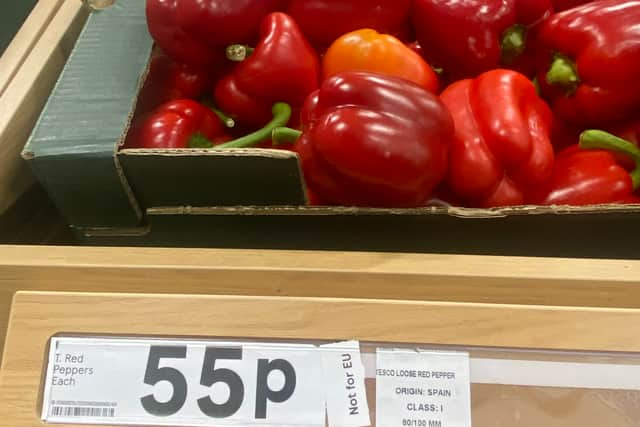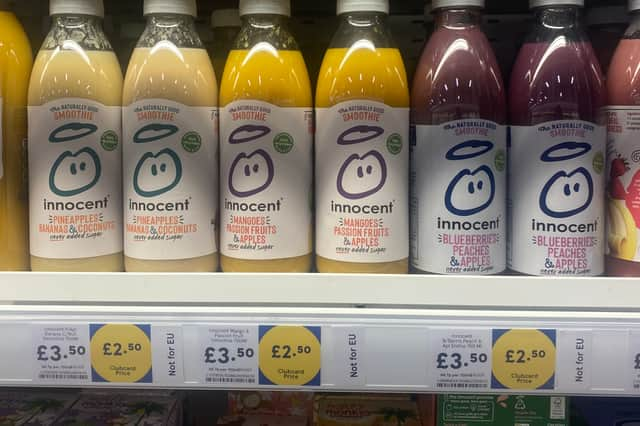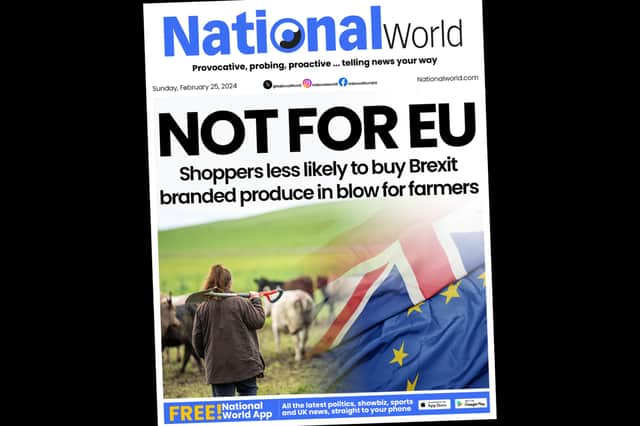What does ‘Not for EU’ labelling mean? Concern post-Brexit food stickers will deter investment and exports
and live on Freeview channel 276
Businesses and trade groups have expressed concern that the ‘Not for EU’ labelling, which will soon be required on all meat and dairy products, will deter investment and harm exports.
Currently, certain food items sold in Northern Ireland require stickers stating they cannot be sold in the European Union, due to close proximity to the Republic of Ireland. This was brought in with the Windsor Framework, so goods sent from Great Britain to Northern Ireland wouldn’t need to undergo full EU border checks.
Advertisement
Hide AdAdvertisement
Hide AdHowever, in October these labels will be required on all meat and dairy products across the whole of the UK. The Food and Drink Federation said this “poses significant risk to exports”, while polling has shown that Britons would be put off buying food with the ‘Not for EU’ stickers.
It’s the latest example of post-Brexit red tape which is hitting businesses in the UK. Only last month, additional checks and paperwork came in on imports from the EU.
What does the ‘Not for EU’ labelling mean?
If you live in Northern Ireland you will have seen ‘Not for EU’ written on meat and dairy labels in supermarkets and shops. This was part of the Windsor Framework agreement, and is designed to ensure those products cannot be sold over the border in the Republic of Ireland, which is part of the EU’s single market.
The border between the North and the Republic is a soft border, which means people can just drive over without having passports or goods checked. However, since Brexit there has to be some guarantee that food sent from Great Britain to Belfast cannot be then moved into the EU. This is why these ‘Not for EU’ labels exist.
Advertisement
Hide AdAdvertisement
Hide Ad

From October 2024, all food and dairy products across the whole of the UK will be required to have these stickers. Some products already have the 'Not for EU' labels, even though it's not mandatory yet. The government says this is essential to keep Northern Ireland part of the UK’s internal market, despite the additional post-Brexit red tape for businesses.
What have businesses said about it?
The Food and Drink Federation has already raised concerns this will significantly hamper British businesses exporting. Balwinder Dhoot, the FDF’s director of industrial growth and sustainability, said: "The planned introduction of ‘Not for EU’ labelling will create a new barrier to trading with our largest export markets in Europe and poses a significant risk to exports. We urge the government to work with industry to come up with a solution that does not impede our export capabilities.”


The FDF is instead arguing for this only to apply for Northern Ireland to reduce red tape. The Financial Times reported that chief executive Karen Betts wrote to the government, saying: “It [Not for EU labels] will lead to higher prices amid a cost of living crisis and to lower investment at a time when investment in our sector is already down.”


While a poll by Survation for the Best of Britain campaign group found almost one in five (18%) people have said they are less likely to buy products labelled 'Not for EU'. While only 28% understand where this meat and dairy comes from, suggesting confusion among consumers.
Advertisement
Hide AdAdvertisement
Hide AdNaomi Smith, chief executive of Best for Britain said: “Almost every agricultural challenge has been made more difficult by Brexit and this government has continued to hammer farmers and food suppliers with terrible new trade deals which undercut British standards.
“The next government must commit to a youth mobility visa scheme to tackle labour shortages, an independent board of trade to protect farmers from fire-sale trade deals, and beneficial regulatory alignment with our largest market to slash red tape.”
A government spokesperson said: “These measures will help ensure that consumers in Northern Ireland have access to the same goods as those in the rest of the United Kingdom, safeguarding the UK internal market and the operation of the Windsor framework.”
Ralph Blackburn is NationalWorld’s politics editor based in Westminster, where he gets special access to Parliament, MPs and government briefings. If you liked this article you can follow Ralph on X (Twitter) here and sign up to his free weekly newsletter Politics Uncovered, which brings you the latest analysis and gossip from Westminster every Sunday morning.
Comment Guidelines
National World encourages reader discussion on our stories. User feedback, insights and back-and-forth exchanges add a rich layer of context to reporting. Please review our Community Guidelines before commenting.
